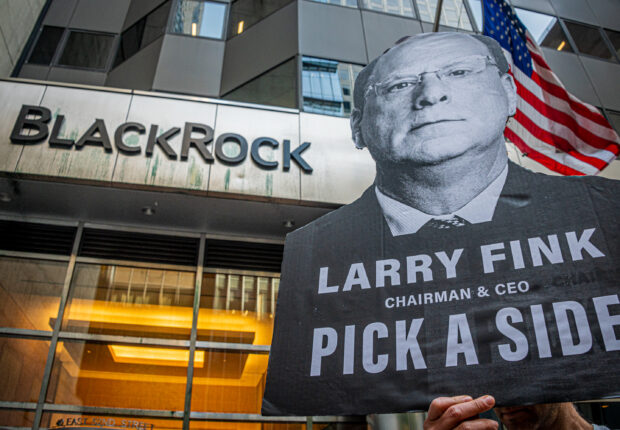BlackRock's new engagement with agribusiness recognizes some risks, but lacks specificity on implementation details and consequences for companies that don't comply.
By Amazon Watch and Friends of the Earth US
(February 7, 2020) Just weeks after releasing a new set of policies on climate change and sustainability, BlackRock, the world’s largest asset manager, quietly published this week a new statement on its approach to engagement with agribusiness — the second leading driver of the climate crisis after fossil fuels. This comes after years of criticism and sustained pressure from climate activists, investors, legislators, and thought leaders on BlackRock for its role as a major investor in the agribusiness commodities most responsible for deforestation.
BlackRock’s statement on its approach to engagement with agribusiness companies is a welcome step toward recognition of the inherent financial, material, and climate risks in the agribusiness sector. But it reveals some serious shortcomings — and, like a previous statement released in 2019 on the firms’ engagement in the palm oil sector, it may raise more questions than it answers.
What BlackRock’s statement does say
BlackRock’s statement, Investment Stewardship’s approach to engagement with agribusiness companies on sustainable business practice, acknowledges important risks associated with agribusiness, including “environmental factors” such as increased greenhouse gas emissions, illegal deforestation, biodiversity loss, waste and water management, as well as “social factors” including land rights, Indigenous Peoples’ rights, workers’ rights, health and safety, bribery and corruption, humane farming practices, and the use of antibiotics in livestock management. The statement reiterates the commitment of BlackRock’s investment stewardship team to “intensify its focus and engagement with companies on sustainability-related risks.” BlackRock acknowledges a range of investment risks associated with agribusiness and commits to engaging with companies in the sector to address and mitigate these risks.
What BlackRock’s statement does not say — and should
While the statement names the aforementioned risks, it fails to explain how BlackRock will measure companies’ exposure to these risks, what standards it will use to gauge companies’ operations, and what consequences there will be for companies that continue to drive widespread deforestation, soil and water pollution, adverse public health impacts, biodiversity loss, land grabbing, labor rights abuses, and broader human rights violations.
Agribusiness globally is routinely involved in widespread deforestation, land grabbing, and human rights violations – including epidemic levels of murder, violence, and criminalization of land and environmental defenders on the front lines of the industrial plantation model. To meet the Paris climate targets, as well as to respect global human rights norms and the Sustainable Development Goals, the world needs a rapid and just transition to agricultural models that respect indigenous and traditional community land rights and are regenerative, resilient, and responsive to the needs, capacities and visions of smallholders and family farmers – those best placed to sustainably feed the world.
To meet the pressing need for a transformation in our food and agriculture systems, BlackRock must strengthen its commitment to sustainable agriculture by taking the following steps:
Adopt a high-level policy: This statement serves as a disclosure — but it is not a policy commitment. BlackRock needs a high-level policy outlining how it will actively address the risks associated with its investments in agribusiness: climate emissions, deforestation, land and human rights, and broader degradation of soil, water, forest cover, and biodiversity.
Require agribusiness to track, disclose, and set targets for reductions in scope 1, 2, and 3 greenhouse gas emissions: The vast majority of agribusiness companies do not disclose the range of their direct and indirect emissions, nor do they have targets for reducing scope 3 (indirect) emissions, which comprise the largest majority of emissions generated by agribusiness companies, especially those that operate in the meat and dairy sector. Many do not have any publicly disclosed targets for even their limited scope 1 emissions. It is critical to require disclosures and reduction targets for Scope 1, 2, and 3 emissions in order to meaningfully assess and reduce the quantity of climate-destabilizing GHGs that are emitted from the agribusiness sector.
Make No Deforestation supply chains a requirement: BlackRock says it “ask(s) companies to disclose any initiatives and externally developed codes of conduct, e.g. committing to deforestation-free supply chains, to which they adhere and to report on outcomes, ideally with some level of independent review.” Given the grave and growing crisis of global deforestation, and the resounding failure of even the leading commodity companies in the Consumer Goods Forum to end deforestation by 2020 as promised, “asking” for change is no longer enough. BlackRock needs to make deforestation-free supply chains a requirement for all investee companies, in both active and passive funds.
Adopt a human rights policy and explicitly adhere to human rights norms: BlackRock says it focuses on “social factors include protecting land rights—particularly those of indigenous peoples, workers’ rights, health and safety as well as working conditions, bribery and corruption prevention.” But these are not merely “social factors” – they are matters of fundamental human rights. BlackRock needs a high level human rights policy to address the broad human rights dimensions of its holdings in agribusiness, including full alignment with International Labor Organization Convention 169, the UN Declaration on the Rights of Indigenous Peoples, and the recently adopted UN Declaration on the Rights of Peasants. In keeping with these and other global norms, BlackRock’s human rights policy — when it develops one — should include a requirement that all investee companies operating on lands claimed by Indigenous Peoples and other local and customary rights holders adhere to robust processes of Free, Prior and Informed Consent. Further, BlackRock should require that its investee companies in high-risk sectors commit to Zero Tolerance for attacks on environmental human rights defenders and local communities.
Make engagement transparent, time-bound, and attached to meaningful consequences: BlackRock’s statement says the firm “will be increasingly disposed to vote against the reelection of relevant board directors when companies have not made sufficient progress.” Yet BlackRock does not indicate how it will determine “sufficient progress.” For corporate engagement to have teeth, clear bright lines and real consequences are required. BlackRock must clarify how it will remain engaged with companies that continue to drive deforestation and land rights abuses and demonstrate when it will take punitive steps such as voting against directors or shifting capital out of intransigent companies.
Require disclosures of lobbying and political spending, and support progressive regulation: BlackRock’s statement recognizes that “ensuring high standards of practice in the agricultural sector depends, in part, on sound public policy and regulatory frameworks that are effectively enforced.” To that end, BlackRock needs to put much greater emphasis on requiring lobbying and political spending disclosures from its investee companies; disclosing its lobbying activities; and actively supporting emerging legislative and regulatory reforms to drive transformation of the global food system. As a global actor with $7 trillion in assets, BlackRock wields outsized political influence. Simply put, it needs to use this influence for social good.
Offer default deforestation-free investment options: BlackRock has billions of dollars invested in agribusiness companies driving deforestation through industrial operations in palm oil, cattle, timber, rubber, and paper and pulp. In seeking to make a transition to climate-positive investing, BlackRock should develop deforestation-free investment options and, along with fossil-free options, make them default products for all clients.
Put people and regenerative practices at the heart of its business model: A true transformation towards climate-positive investing requires more than engaging with agribusiness to ensure best practices that drive value for shareholders. It requires driving agribusiness to add value by engaging in practices that build and restore soil health, promote forest and ecosystem restoration, and ensure that those at the production end of agricultural systems – smallholder farmers, subsistence farmers, Indigenous Peoples, and workers at every level – are at the center of the discussion.
Background:
BlackRock is one of the largest investors in the world in deforestation-linked commodities and the largest global investor in fossil fuels. Deforestation stemming from the production of industrial agricultural commodities are responsible for nearly a quarter of all greenhouse gas emissions and involve clearing hundreds of thousands of hectares of forests, dispossessing indigenous and local communities, and driving protracted land conflicts. Agribusiness is one of the deadliest sectors in the world for environmental defenders and communities on the front lines of extractive industries.
Further reading:
- BlackRock’s Big Deforestation Problem, Friends of the Earth US and Amazon Watch report
- Complicity in Destruction II: How northern consumers and financiers enable Bolsonaro’s assault on the Brazilian Amazon; Amazon Watch report
- BlackRock’s Big Problem Campaign analysis of BlackRock’s January 2019 climate announcement
##
For more information contact
Ada Recinos, ada@amazonwatch.org, 510.680.9701
Jeff Conant, jconant@foe.org, 510.900.0016
Myriam Fallon, myriam@sunriseproject.net, 708.546.9001

